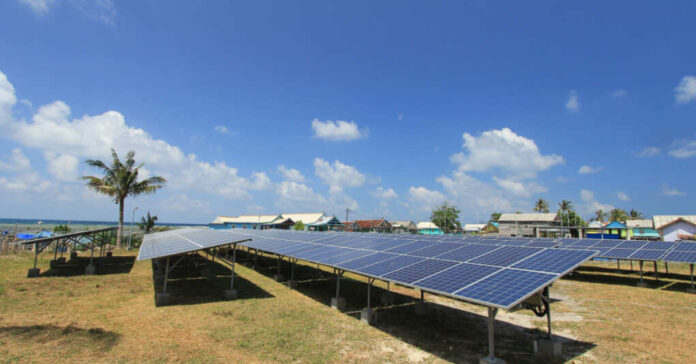
Despite the push by President Biden and other leftists, the US isn’t ready to embrace solar power. For Americans, the option of nuclear power, or other power plant sources are far easier, cheaper up front, and look better than solar panels on our roofs. The idea of selling electricity back to the power plant isn’t that good, and it takes far too long to recoup the investment in savings and sales.
However, in places like remote Indonesia, these panels are worth their weight in gold.
On these hut roofs made of woven palm thatches or recovered tin sheeting with concrete block walls and floors, these poor families are doing everything they can not to suffer and struggle to have just enough to be dirt poor. For these people, a single bulb on a single string can mean the difference between being able to live or not. Being able to work through the night or during inclement weather is huge.
Before these solar panels showed up there, the town ended at nightfall. With no streetlights or power sources, there was no ability to enjoy social gatherings or to work through the night. Instead, these villages would toil as much as they could in the daylight, only to become hermits once darkness settled across their homes. As humans evolved, we learned that this was no way to live our lives, and now, with these panels, so are they.
As it stands, 775 million or so people lack access to electricity across the globe per the International Energy Agency. Concentrated primarily in sub-Saharan Africa and South Asia, these populations are being prevented from building their own economy and independence. By being kept in poverty, they are left out of the modern economy and way of life. For them, these panels provide an opportunity to get in touch with the rest of the globe.
While the grid in Indonesia has jumped from 85% to 97% covered between 2005 and 2020 per the World Bank, over half a million people are still left with no electricity. As a result, many of these remote villages are being targeted by solar companies who are eager to get them installed and sold. Regulations prevent them from selling electricity back to the grid, in turn, makes the panels become an expense on top of the smaller electric bill when the grid expands.
Now, smaller companies like Sumba Sustainable Solutions have come in and done what the liberals who push this solar usually refuse to do; they work with them to get them a minimal panel and light combination that can charge a phone and such. With monthly payments over three years for $3.50, it puts electricity in their hands with the most meniscal of costs.
Doubling down on these efforts, they also offer solar-powered appliances like lamps and grinding machines. This means for people who grind oats and flour to take to the market, they can get their wares ground much faster overnight, and to the market in a reasonable time frame the next day. Gaining the ability to become more self-sufficient is an incredibly powerful thing, and while it is the basis of every good conservative story, the liberals always talk about it but don’t make it happen.
With many who still lack the resources to cover the costs, they are reliant on donors to subsidize the projects and panels to help them keep their lights on. As those without the panels are on the waiting lists, the company is praying for a chunk of Indonesia’s $20 billion Just Energy Transition Partnership deal. Multiple countries are stepping up to pay, and financial institutions are also a part of this.
As locusts destroy crops, many who have received these panels are especially unable to pay their bills. With imported parts that are expensive and hard to source, their maintenance needs a lot of work to remain in full functioning condition. Being able to keep these lights gives them a glimmer of hope.
With the US having options for electricity, we don’t need solar panels as a rule. These people do. The liberals should be worrying about those without, not those who have and want different.














